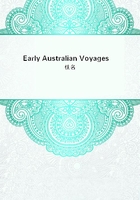
第32章
As to the product and commodities of this country in general, there is the greatest reason in the world to believe that they are extremely rich and valuable, because the richest and finest countries in the known world lie all of them within the same latitude; but to return from conjectures to facts, the country discovered by De Quiros makes a part of this great island, and is the opposite coast to that of Carpentaria. This country, the discoverer called La Australia del Espiritu Santo, in the latitude of 15 degrees 40 minutes south, and, as he reports, it abounds with gold, silver, pearl, nutmegs, mace, ginger, and sugar-canes, of an extraordinary size. I do not wonder that formerly the fact might be doubted, but at present I think there is sufficient reason to induce us to believe it, for Captain Dampier describes the country about Cape St. George and Port Mountague, which are within 9 degrees of the country described by De Quiros. I say Captain Dampier describes what he saw in the following words: "The country hereabouts is mountainous and woody, full of rich valleys and pleasant fresh-water brooks; the mould in the valleys is deep and yellowish, that on the sides of the hills of a very brown colour, and not very deep, but rocky underneath, yet excellent planting land; the trees in general are neither very straight, thick, nor tall, yet appear green and pleasant enough; some of them bear flowers, some berries, and others big fruits, but all unknown to any of us; cocoa-nut trees thrive very well here, as well on the bays by the sea-side, as more remote among the plantations; the nuts are of an indifferent size, the milk and kernel very thick and pleasant; here are ginger, yams, and other very good roots for the pot, that our men saw and tasted; what other fruits or roots the country affords I know not; here are hogs and dogs, other land animals we saw none; the fowls we saw and knew were pigeons, parrots, cocadores, and crows, like those in England; a sort of birds about the bigness of a blackbird, and smaller birds many. The sea and rivers have plenty of fish; we saw abundance, though we catched but few, and these were cavallies, yellow-tails, and whip-wreys."
This account is grounded only on a very slight view, whereas De Quiros resided for some time in the place he has mentioned. In another place Captain Dampier observes that he saw nutmegs amongst them, which seemed to be fresh-gathered, all which agrees perfectly with the account given by De Quiros; add to this, that Schovten had likewise observed, that they had ginger upon this coast, and some other spices, so that on the whole there seems not the least reason to doubt that if any part of this country was settled, it must be attended with a very rich commerce; for it cannot be supposed that all these writers should be either mistaken, or that they should concur in a design to impose upon their readers; which is the less to be suspected, if we consider how well their reports agree with the situation of the country, and that the trees on the land, and the fish on the coast, corresponding exactly with the trees of those countries, and the fish on the coasts, where these commodities are known to abound within land, seem to intimate a perfect conformity throughout.
The next thing to be considered is, the possibility of planting in this part of the world, which at first sight, I must confess, seems to be attended with considerable difficulties with respect to every other nation except the Dutch, who either from Batavia, the Moluccas, or even from the Cape of Good Hope, might with ease settle themselves wherever they thought fit; as, however, they have neglected this for above a century, there seems to be no reason why their conduct in this respect should become the rule of other nations, or why any other nation should be apprehensive of drawing on herself the displeasure of the Dutch, by endeavouring to turn to their benefit countries the Dutch have so long suffered to lie, with respect to Europe, waste and desert.
The first point, with respect to a discovery, would be to send a small squadron on the coast of Van Diemen's Land, and from thence round, in the same course taken by Captain Tasman, by the coast of New Guinea, which might enable the nations that attempted it to come to an absolute certainty with regard to its commodities and commerce. Such a voyage as this might be performed with very great ease, and at a small expense, by our East India Company; and this in the space of eight or nine months' time; and considering what mighty advantages might accrue to the nation, there seems to be nothing harsh or improbable in supposing that some time or other, when the legislature is more than usually intent on affairs of commerce, they may be directed to make such an expedition at the expense of the public. By this means all the back coast of New Holland and New Guinea might be thoroughly examined, and we might know as well, and as certainly as the Dutch, how far a colony settled there might answer our expectations; one thing is certain, that to persons used to the navigation of the Indies, such an expedition could not be thought either dangerous or difficult, because it is already sufficiently known that there are everywhere islands upon the coast, where ships upon such a discovery might be sure to meet with refreshments, as is plain from Commodore Roggewein's voyage, made little more than twenty years ago.